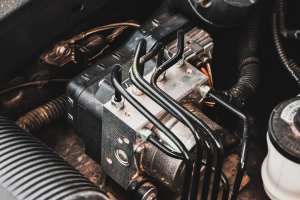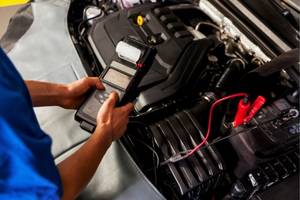Introduction
Imagine driving your cherished BMW when suddenly, it starts behaving unpredictably. One possible culprit could be a malfunctioning Engine Control Module (ECM), which acts as the brain of your car's engine. This guide is designed to simplify the complicated world of BMW ECM repair. Whether you're facing unusual engine performance or struggling with continuous warning lights, understanding ECM issues and repair techniques can help you navigate through these challenges with confidence.
1. Identify common BMW ECM issues
The first step on the path of BMW ECM repair is understanding what could potentially go wrong. So what are some of the common issues you might encounter?
The Dreaded Check Engine Light: This little light is your car's way of saying: "Something's wrong with the ECM." It might be a minor hiccup or a serious issue, but you won't know until you take a closer look.
Unpredictable Engine Behavior: If your BMW's engine is acting more unpredictable than a cat on a hot tin roof, your ECM might be the culprit. Symptoms can include everything from poor fuel efficiency and power loss to more serious issues such as engine stalling or not starting at all.
Issues With Transmission: The ECM isn't just responsible for managing the engine; it also works hand-in-hand with your transmission. If you're noticing rough or abnormal shifts, it could be a sign of an ECM problem.
Failed Emissions Test: If your vehicle can't pass an emissions test, it might be due to a faulty ECM. The ECM is responsible for controlling your car's emissions, and any malfunctions can lead to higher than normal emission levels.
In the world of BMW ECM repair, knowing the issues is half the battle. By understanding what the common issues are, you're one step closer to getting your BMW's ECM back in top shape. But remember, these are just potential issues. The key to a successful BMW ECM repair is accurate diagnosis, which brings us to the next part of our guide. Stay tuned!
2. Techniques for diagnosing BMW ECM problems
Now that we've covered the common BMW ECM issues, let's dive into the diagnostic process. How do you go from "I think I have a problem" to "I know what the problem is"? Here are some useful techniques:
OBD-II Scanner: This little device is a lifesaver when it comes to BMW ECM repairs. Simply plug it into your car's OBD-II port, and it will read any error codes your ECM might be giving. Remember, though that these codes are just a starting point; — they'll tell you what the ECM thinks is wrong, but not necessarily the root cause of the problem.
Visual Inspection: Sometimes, the problem is something you can see. Things like corroded connectors, damaged wires, or even a physically damaged ECM can cause all sorts of havoc. A thorough visual inspection can often reveal these issues.
ECM Testing: This is where things get a bit more technical. There are various tools and methods professionals use to test the ECM directly, including multimeters, oscilloscopes, and ECM testing devices. These tools can help confirm whether the ECM itself is at fault or if the problem lies elsewhere.
Professional Diagnostics: If all else fails, and the problem remains complicated, it's time to call in the professionals. A trained BMW technician has the experience and specialised equipment to accurately diagnose any ECM issues.
By using these techniques, you can get a clear picture of the issues casuing trouble to your BMW's ECM. But remember, diagnosing the problem is only half the story. Now comes the real challenge: the actual BMW ECM repair. Buckle up, because we're about to get our hands dirty!
3. Best practices for BMW ECM repair
Just like a doctor needs to follow the best practices when performing a surgery, it's essential for you to follow the best practices when it comes to BMW ECM repair. So, what does this involve?
Disconnect the Battery
The first thing you should do before you start any BMW ECM repair is to disconnect the battery. This prevents any electrical mishaps or shorts that can potentially cause more damage. And trust me, the last thing you want is to turn a simple repair into a major one!
Handle with Care
Next, always handle the ECM with care. It's a fine piece of equipment, and any unnecessary force or mishandling can damage it further. So, gentle hands are key here!
Use Quality Replacement Parts
When it comes to replacement parts, don't try to compromise with quality. Sure, you might save a few bucks on a cheaper part, but if it fails sooner or causes other issues, you'll end up paying more in the long run.
Ensure Proper Installation
Proper installation of the ECM is critical. Make sure it's securely mounted and all connectors are properly attached. An improperly installed ECM can lead to all sorts of problems, so take your time and do it right.
Reset and Relearn
After the BMW ECM repair and reinstallation, you'll need to reset the ECM and allow it to 'relearn' your driving habits. This ensures optimal performance and fuel efficiency.
By following these best practices, you'll ensure that your BMW ECM repair is as successful and trouble-free as possible. But remember, maintaining your ECM is just as important as repairing it. So let's move on to some tips for maintaining your BMW ECM.
4. Tips for maintaining your BMW ECM
Maintaining your ECM can be just as important as a successful BMW ECM repair. So, how do you keep this important component in tip-top shape and avoid future repairs? Let's get started.
Regular Vehicle Inspection
Carrying out regular vehicle inspections is a must. This can help spot any potential ECM issues before they turn into much bigger problems. So, make it a habit to inspect your BMW regularly.
Keep Your Vehicle Clean
The cleanliness of your vehicle isn't just about looks; it can also impact the health of your ECM. Dust and dirt can interfere with the ECM's function. So, keeping your vehicle clean can help keep your ECM working smoothly.
Regular Software Updates
Just like your laptop or smartphone, your BMW's ECM needs regular software updates. These updates can fix bugs, enhance performance, and even add new features. So, always stay on top of any software updates for your BMW.
Don't Ignore Warning Lights
Warning lights on your dashboard are there for a reason. If you see one, don't ignore it. It could be your ECM trying to tell you something. Ignoring a warning light can lead to further damage and potentially a more costly BMW ECM repair.
Use Quality Fuel
Lastly, using quality fuel can help keep your ECM—and your BMW—in good shape. Low-quality fuel can lead to buildup and other issues that can affect your ECM's performance.
By following these tips, you can ensure your BMW ECM stays healthy for longer, potentially saving you from future BMW ECM repairs. Remember, prevention is always better than cure, especially when it comes to your BMW's ECM!
Conclusion
In the realm of BMW ECM repair, knowledge is your greatest asset. From identifying common issues and employing effective diagnostic techniques to following best practices during repairs and maintaining your ECM, each step is necessary for making sure your vehicle’s ideal performance. By staying informed and dynamic, you can address ECM problems efficiently and keep your BMW running smoothly. Remember, a well-maintained ECM not only improves your driving experience but also increases the life of your vehicle.
FAQs on
Comprehensive Guide to BMW ECM Repair in 2025 : Best Practices
-
1. What are the most common symptoms of a failing BMW ECM?
Ans.
Common signs include the illumination of the Check Engine Light, unusual engine performance such as stalling or poor fuel efficiency, transmission problems, and issues with passing emissions tests. If you notice any of these symptoms, it could be an indication of ECM trouble.
-
2. How can I diagnose ECM problems in my BMW?
Ans.
Diagnosing ECM problems generally involves using an OBD-II scanner to read error codes, performing a visual inspection for physical damage or corroded connections, and using specialized tools for direct ECM testing. If these methods don’t resolve the issue, discussing with a professional technician might be necessary.
-
3. What should I do before starting ECM repairs?
Ans.
Before beginning any repairs, make sure you disconnect the battery to prevent electrical shorts. Handle the ECM with care, use high-quality replacement parts, and follow proper installation procedures to avoid further issues.
-
4. How can I maintain my BMW ECM to prevent future issues?
Ans.
Regular vehicle inspections, keeping your car clean, updating the ECM software, responding to warning lights quickly, and using quality fuel are all important practices for maintaining your ECM and preventing future problems.
-
5. Can I repair my BMW ECM myself or should I seek professional help?
Ans.
While minor issues can sometimes be addressed with DIY methods, ECM repair often requires specialized knowledge and equipment. For complicated problems or if you are not sure, it is recommended to seek help from a professional BMW technician to make sure accurate diagnosis and repair.
-
6. What are the risks of ignoring ECM problems in my BMW?
Ans.
Ignoring ECM issues can lead to worsening symptoms, such as increased fuel consumption, engine stalling, transmission problems, and failed emissions tests. Over time, these issues can cause more serious and costly damage to your vehicle, making timely repair essential.


